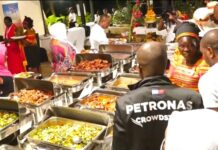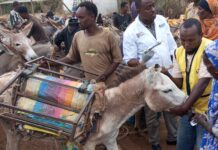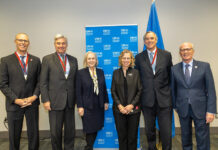By Gabrielle Nina Mitch
The Independent Electoral Commission in the Democratic Republic of Congo has selected 874 candidates to contest for 100 seats in the forth coming Senatorial elections scheduled for March 14, 2019.
However, the elections are not expected to raise the bar in terms of promising good projects for the society but to take it higher in terms of corruption and the bribing of MLAs, who are senators’ electors according to the constitution.
Some candidates who spoke on condition of anonymity said some provincial MPs, among those who will vote for the governors and senators next March, are demanding a sum ranging from US$20 000 to US$50 000 for their vote.

The candidates said other provincial MPs do not hesitate to raise the auction to astronomical amounts reaching as high as US$100 000 for a vote and this bidding started since the publication of the results of P
According to the constitution of the DRC, senators, and governors are elected by the provincial MPs by indirect universal suffrage. The provincial elected representatives of December 30, 2018, and the co-opted traditional kings will elect 100 senators from the provinces concerned by these elections.
The city province of Kinshasa has a quota of 8 senators and 4 senators for each of the other provinces. 108 senators will sit in the upper house of the Congolese parliament. For this legislature, the number of seats rose to 109, with the entry of Joseph Kabila as a senator for life.
In the province of North Kivu and Maï-Ndombe, elections of senators will be held after the holding of the national and provincial legislative elections rescheduled for March 31st. While in the constituencies of Beni-
It was the businessman, Adam Bombole, then candidate to the senatorial elections, who first sounded the alarm as he withdrew his candidacy from the elections.
Bombole posted his withdrawal letter on his Twitter account and said, in part, “I would never subject to corruption, would always walk headlong, looking all the right in the eye, God bless the DRC.”
« Chacun d’entre nous porte seul la responsabilité de la forme éthique qu’il a donnée à sa propre vie »
Jürgen Habermas .Je ne me soumettrais jamais à la corruption,marcherais toujours tête haute,regardant tous mes semblables droit dans les yeux .
Que Dieu bénisse la RDC pic.twitter.com/jTLhxOkJs8— Adam Bombole (@AdamBombole) February 15, 2019
Another whistleblower, Vidiye Tshimanga, who is is one of the ruling president’s closest and leading senatorial candidates, has openly denounced large-scale corruption in provincial assemblies.
Elections sénatoriales : Vidiye Tshimanga dénonce la corruption et retire sa candidature après Adam Bombole
— Lola S (@lolasylla1) February 15, 2019
“Must you be the best corrupting to become Governor or Senate?” he questioned on his Twitter account while announcing the withdrawal of his candidacy after realizing the high level of corruption that plagues the country.
Another senatorial candidate, who has just extended the list of whistle-blowers of open-air corruption practices during this pre-election period, is Luzolo Bambi, former Minister of Justice in the Joseph Kabila regime between 2008 and 2012.
#RDC Première dénonciation judiciaire formelle de #Corruption des grands électeurs signée LUZOLO BAMBI LESSA. A la justice de faire son travail. pic.twitter.com/02GqjUpPRg
— Eric Tshikuma (@erictshikuma) February 25, 2019
In his withdrawal letter of February 22, addressed to Corneille Naanga, the president of the Independent National Electoral Commission (INEC), Luzolo stated that, he is motivated by the minting of the votes of the provincial deputies, who will soon elect the senators and governors.
“Believing in the ethical and republican values in the access to and the management of public offices, I freely take the decision to withdraw my candidacy for the Senate election, but having noted and experienced this election, I prefer to safeguard my values for personal proprieties of my honor without price ” he said in his letter made published on social media.
However, in the provincial assemblies, nobody feels concerned and they reject these accusations. When asked at personal levels, none of the provincial MPs agreed that they are corrupt.
“We are not goods to be bought,” said the Honorable Ida Mutala, MPP in Kinshasa.
However, the Secretary G
“Two senatorial candidates have come to my office, asking me the directories or the numbers of MP X or Y, I checked in the directory, wrote down the number and I give it to them, I’m not part of the talk that goes on between them,” Joachim Mungu said.

Many
At this pace of things, the provincial assembly has become an institution where the voices are haggling, only the highest-ranking senators deserve a seat.
The only unsuspecting senator to corruption is the former President of the Republic Joseph Kabila who led the country for 18 years.
Unlike other senators, it is the constitution that grants him as a former president, the Senator’s status for life, which is a first time development in the DRC.
According to The Church of Christ in Congo, a Christian community whose mission is to protect and defend public morals for the safeguarding of their homeland, they say they have palpable facts about this corruption and intend to make them available to the prosecutor for possible prosecution.
“The ECC is protesting against certain corruption and anti-corruption practices on the way in which positions of responsibility are negotiated at the level of governorates, provincial and national assembly offices and senatorial seats at the risk of towards the effectiveness of the rule of law, ” said Eric Nsenga spokesperson of the Church of Christ in Congo.
With a score of 21%, the DRC is ranked among the twenty most corrupt countries in the world, according to the report on the Corruption Perception Index for 2018, published by Transparency International.
Experts warn that these corrupt practices will first lead to the destruction of the democratic system in the DRC, weaken parliamentary control, put a brake on economic development, increase business costs, undermine legitimacy of the government and reduce the confidence of the people.
It could then lead to political instability and lack of social cohesion in the country. There’s an urgent need to find another mechanism of electing














